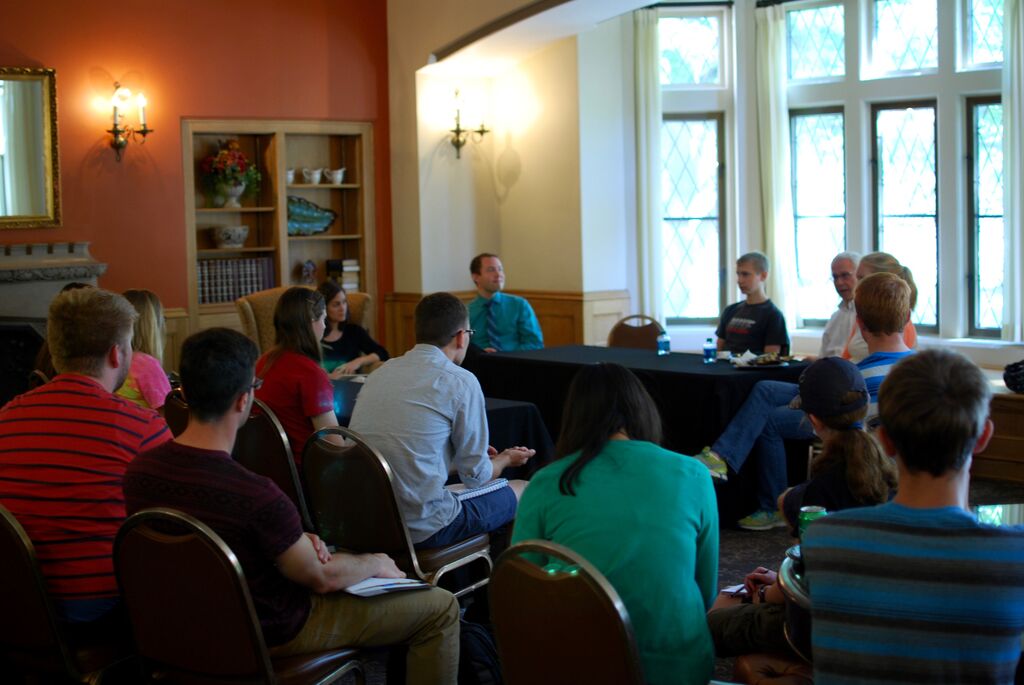Undergraduate Research and the Honors College
November 6, 2015
By Emma Alexander, Honors Communications Intern
Undergraduate research is commonplace at Purdue, and when asked why they chose to attend Purdue University, many students will refer to the vast amounts of research opportunities available to undergraduates. However, with so many opportunities, it can be easy to get lost and overwhelmed. As a first or second year student interested in participating in research, it may be difficult even to know where to begin. Guidance was provided in the form of lunchtime discussions and panels, featuring undergraduate researchers and their mentors hosted by the Honors College and the National and International Scholarships Office. These events, collectively referred to as The Building Blocks of Undergraduate Research, have occurred throughout the semester focusing on the unique experiences in each disciplinary college.
Dr. Elizabeth Brite, one of the key coordinators for the Building Blocks sessions, shared, “the goal for the Honors College is to be a source on campus, an academic home, where students, not just honors students, but everybody, can come to find information and get engaged in these activities.”
However, there are many other entities on campus and resources to discover and explore more about research opportunities. The Office of the Executive Vice President for Research and Partnerships is one key resource on campus. They have a great, centralized website for undergraduate research which students can explore. This website also offers links to other programs on campus, particularly those that offer monetary stipends for research.
But despite how exceptional one resource may be, it is infeasible to expect all of this information on every lab and research project to be consolidated in one place. This was a topic discussed at the Building Blocks sessions. Students and faculty had the opportunity to discuss the process of seeking out this information. Such efforts could include actions such as looking up faculty members, reading their biographies on department websites, as well as using resources such a google scholar to search important papers published and perhaps even read abstracts of specific projects of interest.
Another proactive step students were encouraged to take was to reach out to faculty. Do the legwork and take the time to get to know a little more about what they are researching. Faculty members are looking for undergraduates who are going to be committed, dependable, have an interest in what’s happening, and are looking to build and apply the skills to that effort. However, everyone, students and professors alike, stressed the importance of not getting discouraged by being told no. Not all professors are in need of nor are they equipped for undergraduate researchers. However, what many students have found is that even by reaching out to one faculty member and being rejected, that professor may recommend them to another. And so the process continues to grow and grow, a never-ending stream of possibilities.

Above: students listen to the panel and take notes at the Building Blocks engineering event
Sophomore in biochemistry and honors student, Mary Witucki, has been participating in research at Purdue since before she even began her freshman classes. Mary was one of the student researchers invited to speak at the Building Blocks session. With regards to the Building Blocks sessions, she shared,
I wish someone could have led me through all the bumps and obstacles of my first semester of research. Participating in this event was great because I also just love talking about my love for research. If I can help even a few people find something that they are passionate about, then that’s a win in my book.
Looking forward, the Honors College and NISO hope to host another series of Building Blocks sessions. The Honors College will also be offering thesis classes. Dr. Brite explains that these classes are focused on the thesis, but they are just as much about the process of taking these opportunities, developing them, and turning them into those independent projects.
It is understood that research isn’t for everyone. However, for those who are even slightly intrigued, it is certainly an opportunity to explore further. The opportunities are many, the benefits are great, and the possibilities are truly endless. To watch some research story videos, visit our undergraduate research page.



